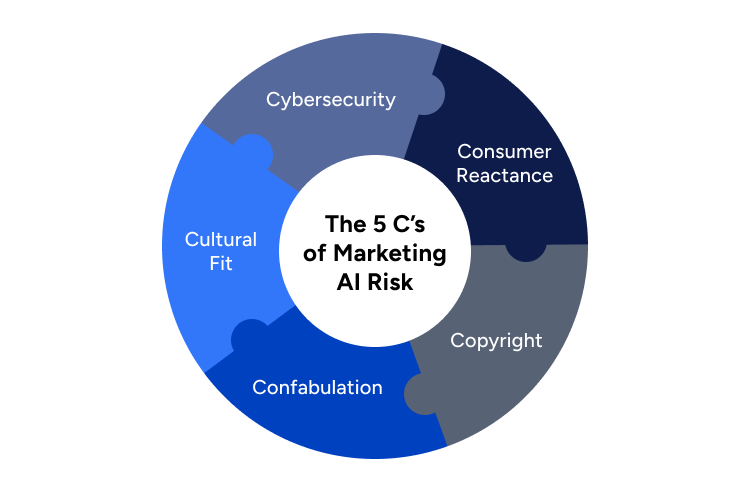What to Know to Build an Effective Marketing AI Strategy



In order to realize Artificial Intelligence's giant potential, CMOs need to build an effective Marketing AI strategy. AI enables unprecedented levels of hyper-personalization and efficiency, allowing marketers to tailor communications and offers with precision.
Marketing campaigns that previously required extensive time and resources can now be executed in a few days, featuring at-scale personalization and automated testing. This enhances customer engagement and satisfaction by delivering seamless, cohesive experiences and improving omnichannel strategies.
According to a recent McKinsey report, generative AI could contribute up to $4.4 trillion in annual global productivity, with marketing and sales capturing a significant portion of this value. However, its adoption remains limited, with only 10%-14% of companies consistently deploying generative AI in their marketing and sales strategies.
This article will explore the potential of marketing AI in answering these five questions:
- What are the key frameworks of Marketing AI, and how do they work?
- What is the current status of generative AI implementation in marketing?
- How does generative AI create value in marketing through the four Cs: Customization, Creativity, Connectivity, and Cost of Cognition?
- How can generative AI be integrated effectively throughout the customer journey?
- What are the practical steps for implementing a Marketing AI strategy?
Understanding Marketing AI Applications to Build an Effective Strategy
To build an effective Marketing AI strategy, companies need to classify all the possible applications, which can be categorized into two dimensions:
- Intelligence level
- Whether it operates as a stand-alone application or as part of a broader platform.
Depending on their implementation, technologies like chatbots or recommendation engines can fit into four categories.
Task Automation
These applications handle repetitive, structured tasks requiring low levels of intelligence. They follow set rules or perform a predetermined sequence of operations based on input. However, they cannot handle complex issues like complex customer requests.
Examples include systems that send automatic welcome emails to new customers and simple chatbots that guide customers through basic interactions using decision trees without learning from interactions or understanding customer intent.
Machine learning
These algorithms use large datasets to make complex predictions and decisions. They can recognize images, decrypt text, segment customers, and anticipate responses to marketing initiatives.
Machine learning powers online advertising, e-commerce recommendations, and CRM sales models. Despite their effectiveness, these models are task-specific and require extensive training on large datasets.
Stand-alone applications
Isolated AI programs, separate from primary customer channels. Users must engage with these applications beyond the usual channels for product interaction. For example, IBM Watson's Personality Insights analyzes textual data from social media posts, customer reviews, and emails to infer personality characteristics, which can then be used for personalized marketing and customer engagement strategies.
Integrated applications
These are embedded within existing systems, making them less visible to users. They function seamlessly within platforms, like machine learning algorithms that determine digital ad placements.
Netflix’s recommendation engine is an example, offering suggestions directly within its menu rather than requiring a separate app. Similarly, CRM systems like Salesforce's Sales Cloud Einstein integrate machine learning for lead scoring, automatically ranking B2B leads by purchase likelihood.

Which type of AI is the most relevant for Marketing?
Integrated machine-learning applications are the most valuable for marketing. They combine task automation with advanced machine learning to extract data, make complex decisions, and personalize communications.
This integrated approach provides more sophisticated capabilities than stand-alone solutions. While stand-alone applications still have their uses, their impact is limited compared to the benefits offered by integrated systems. An effective marketing AI strategy needs to ensure this seamless integration, enhancing both efficiency and customer engagement.
According to Deloitte, executives agreed that “AI will be integrated into all enterprise applications within three years.” In particular, one key area shows the highest potential to disrupt modern marketing: Generative AI.
Gen AI Implementation in Marketing: the Current Status
According to a BCG survey, marketing AI applications are on the rise, especially in GenAI, as this technology extends beyond simple automation, offering transformative creativity, efficiency, and decision-making benefits.
A key area where CMOs leverage GenAI is hyper-personalization, with 67% of respondents using it to create tailored customer experiences. For instance, banks might use GenAI to analyze customer data and provide investment advice tailored to individual risk preferences, while retailers might apply GenAI to generate personalized recommendations encouraging shoppers to make additional purchases. This personalized approach generally boosts customer engagement and loyalty.
Additionally, 49% of CMOs are using GenAI to accelerate content creation, allowing marketing teams to produce high-quality content more efficiently, thereby freeing up resources for innovation.

Generative AI (GenAI) is driving operational improvements, with 93% of Chief Marketing Officers (CMOs) reporting better work organization and 91% seeing increased efficiency. Productivity gains have reached up to 30%.
Moreover, 84% of Chief Marketing Officers (CMOs) are planning to introduce new products and business models powered by Generative AI (GenAI), highlighting its potential to fuel innovation. GenAI is expected to make processes safer, minimize errors, and improve work quality. Nearly half (47%) of CMOs believe it will greatly enhance their capacity to drive innovation in their organizations.

Given the growing importance of Gen AI, the majority of organizations (71%) anticipate that some marketing roles will be impacted by generative AI. These include SEO specialists, digital marketing and creative directors, PR/communication specialists, copywriters, and customer insight specialists.
The Five Cs of Marketing AI Risk
Generative AI, while powerful, introduces several risks that marketers must navigate carefully. Building on research by Harvard Business Review, there are five “Cs” to be addressed: Confabulation, Consumer Reactance, Cultural Fit, Copyright, and Cybersecurity.

Confabulation
One of the primary risks of generative AI is its tendency to produce content that is either factually incorrect or contextually inappropriate. This happens because GenAI models, while sophisticated, can sometimes generate outputs that sound plausible but are not accurate.
For example, an AI-generated product description might inaccurately represent features or benefits, resulting in customer dissatisfaction and trust issues. Additionally, AI-generated content can inadvertently include biases in the training data, leading to insensitive outputs that can offend certain customer segments.
Consumer Reactance
Generative AI technologies, while efficient, can sometimes produce outputs that feel too automated or impersonal, leading to negative consumer perceptions. This is particularly problematic in areas that traditionally require human qualities, such as customer service interactions, personalized communication, and content creation.
Consumers may react negatively to AI-generated marketing content if they perceive it as lacking authenticity or empathy. For instance, an AI-driven customer service chatbot may fail to understand the emotional aspects of a customer's inquiry, leading to unsatisfactory interactions.
Copyright Issues
Generative AI raises complex questions about creative ownership and copyright. Since AI systems often use large datasets, including copyrighted material, to generate new content, there is a risk of unintentional infringement. For instance, if an AI tool generates an image or text that closely resembles existing copyrighted work, the company using this content could face legal challenges, but by using an AI humanizer, the generated content could be adjusted to ensure it doesn’t infringe on any copyrights.
Moreover, the legal landscape around AI-generated content is still evolving, creating uncertainty around who holds the rights to such creations. This ambiguity can expose companies to legal risks, especially when the content is used in public-facing marketing materials.
Cultural Reluctance
Integrating generative AI into the workplace can face resistance from employees working in marketing, as concerns about AI replacing jobs or altering the creative process can lead to apprehension.
It's essential to communicate that AI is meant to augment rather than replace human roles, reallocating cognitive resources to more strategic tasks. Training and involving employees in the AI integration process can help align the technology with the company’s culture and values.
Cybersecurity
GenAI introduces new cybersecurity risks. These include "prompt injection attacks" where hackers manipulate chatbots or AI systems to generate deceptive content or reveal sensitive data. As AI systems become more integrated into marketing and sales processes, they can become targets for cybercriminals.
For example, an AI-driven system that handles customer data could be tricked into divulging sensitive information, leading to data breaches and compromising customer trust. The financial implications of such attacks are significant, with the global cost of a data breach averaging $4.45 million. More critically, the damage to a brand's reputation can be long-lasting, impacting customer loyalty and market standing.
How to Mitigate Risks to Build the Perfect Marketing AI Strategy
As underlined by McKinsey, there are six actions that companies can implement to develop a strong Marketing AI strategy.

Conduct a GenAI Audit
Begin by evaluating the current marketing and sales infrastructure to identify areas where GenAI can be integrated safely. This involves assessing the existing technology stack, data quality, and skill sets within the organization.
An audit helps uncover potential vulnerabilities and areas where AI can add value without compromising integrity. For instance, examining how AI-generated content aligns with brand messaging can prevent confabulation issues.
Form a GenAI Taskforce
Establish a cross-functional team comprising experts from marketing, sales, pricing, IT, and legal departments. This task force should explore AI opportunities, assess risks, and develop strategies for safe implementation.
By including these perspectives, companies can ensure a balanced approach that considers both AI use's technical and ethical implications. This team will also oversee AI initiatives and maintain oversight of AI-generated content to ensure it aligns with brand values.
Identify Low-Hanging Fruit
Start by implementing GenAI in low-risk, high-impact areas. Focus on use cases that offer significant benefits with minimal risks, such as automating routine tasks or enhancing internal processes.
For example, using AI to optimize email marketing campaigns can improve efficiency without directly impacting customer interactions. This approach allows companies to gain experience with AI applications while minimizing potential downsides.
Launch Targeted Experiments
Pilot AI applications in controlled environments to assess their performance and identify potential risks. For instance, testing AI-generated content in a small segment of the customer base can provide insights into its effectiveness and any areas of concern.
Monitor the outcomes closely and refine the approach based on feedback and observed risks. This iterative process helps identify what works and needs adjustment before a broader rollout.
Conduct Team Training
Educate marketing and sales teams on the fundamentals of GenAI, emphasizing the importance of human oversight. Training should cover how to use AI tools effectively and responsibly, including recognizing and addressing potential confabulations or biases in AI-generated content. Equip the team with the skills to critically evaluate AI outputs and make informed decisions, ensuring that AI complements rather than replaces the human element in marketing.
Establish Guidelines
Develop comprehensive guidelines for using GenAI in marketing. These should include policies for data usage, content verification, and cybersecurity protocols. For example, establish standards for verifying AI-generated content before it is published to avoid inaccuracies and ensure compliance with copyright laws. Implementing robust data security measures can mitigate the risk of prompt injection attacks and other cyber threats. Clear guidelines provide a framework for responsible AI use and help maintain brand integrity.
Case Study: Marketing AI Strategy for Leading Automotive Supplier
To create a comprehensive Marketing AI strategy, human oversight and accountability are crucial. This often requires the development of new roles and skills to integrate AI's potential while managing the associated risks. However, 68% of executives report a moderate-to-extreme skills gap in AI, with 27% considering the skills gap as an “extreme” issue.
Here is where Artificial Intelligence Consultants can provide support, speeding up the process and helping organizations address the associated risks. In particular, engaging freelance AI consultants offers a cost-effective and flexible solution, allowing organizations to leverage expert knowledge and implement advanced AI strategies. Let's explore a use case.
A German leading automotive supplier needed help to enhance its marketing and sales strategies using generative AI. They needed to improve content generation, monitor performance, and train their marketing team effectively.
The client engaged Consultport to find an AI expert to tackle these challenges. Within 48 hours, Consultport proposed three consultants, and the company selected a former Capgemini consultant with experience in integrating AI technology.

The consultant conducted a detailed audit of the company’s marketing processes and implemented an AI-powered content generation platform using natural language processing (NLP) to create personalized materials.
Moreover, the consultant set up an AI-driven performance monitoring system to analyze customer interactions in real time. Finally, the consultant developed a training program to help the marketing team utilize AI-generated insights for campaign optimization.
This approach led to a 30% reduction in content creation time and a 15% increase in customer engagement rates in the first year of implementation. This case demonstrates the impact of integrating AI into marketing strategies, driving significant improvements in efficiency and customer engagement.
Want to know more? Find a Consultant.

Olga is an Online Marketing Expert with over ten years of experience, including at Rocket Internet. During her time at Rocket Internet, Olga built comprehensive online marketing strategies and led their execution for several online businesses in the e-commerce space, including organic and paid-user acquisition. Her expertise also includes SEO, content marketing, social media strategy, and conversion rate optimization.
on a weekly basis.


